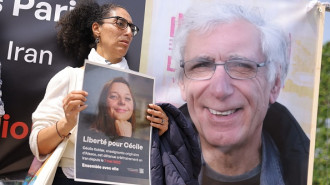Saudi TV channel leaves Bahrain after going off-air
Saudi TV channel leaves Bahrain after going off-air
Al-Arab, which was removed from the airwaves after broadcasting an interview with a Bahraini opposition leader, will not return to Manama.
3 min read
The channel was on air fewer than 24 hours [AlArab/YouTube]
The Manama-based Al-Arab television channel, which was suspended on Sunday after airing an interview with a prominent local opposition activist, is to leave Bahrain, it has emerged.
Al-Araby al-Jadeed has obtained a transcript of a letter sent by Fahd al-Sukait, the TV channel's chairman and CEO, to Bahraini Information Minister Issa Ben Abdulrahman al-Hamadi.
The letter indicated that the channel refused to succumb to the conditions imposed by the ministry to resume broadcasting from Bahrain.
"As an independent news channel, the conditions imposed by the ministry restrict us and make us unable to compete with other regional news channels such as al-Jazeera and al-Arabiya, and international ones like al-Hurra and BBC," wrote Sukait.
"Given that these conditions do not comply with the contract we signed with your ministry, I hereby inform you that we shall not accept any amendments to any previously sealed agreement between us."
Al-Arab began broadcasting on Sunday afternoon from Manama. By dawn on Monday, it was off the air.
Bahrain's information ministry said the station had been temporarily suspended and that it was working with Al-Arab management to resolve the matter. There are understood to be behind-the-scenes talks on the channel moving its headquarters to London or Beirut, where fewer broadcasting limits exist.
Since moving to London is difficult, given the high-cost and stringent broadcasting regulations, the channel is more likely to settle in Beirut and resume broadcasting from there.
Three days after the channel was suspended, no official explanation as to why it was forced off air has yet been issued. But the removal of the channel from the airwaves came hours after Al-Arab broadcast an interview with Khalil Marzouq, the assistant secretary-general of Bahrain's opposition Al-Wefaq Movement.
During the interview, Marzouq criticised the Bahraini
authorities' crackdown on opposition leaders across the country.
Al-Arab's General Manager Jamal Khashoggi has tweeted that the channel will go back on air soon.
This article is an edited translation from our Arabic edition.
Al-Araby al-Jadeed has obtained a transcript of a letter sent by Fahd al-Sukait, the TV channel's chairman and CEO, to Bahraini Information Minister Issa Ben Abdulrahman al-Hamadi.
The letter indicated that the channel refused to succumb to the conditions imposed by the ministry to resume broadcasting from Bahrain.
"As an independent news channel, the conditions imposed by the ministry restrict us and make us unable to compete with other regional news channels such as al-Jazeera and al-Arabiya, and international ones like al-Hurra and BBC," wrote Sukait.
"Given that these conditions do not comply with the contract we signed with your ministry, I hereby inform you that we shall not accept any amendments to any previously sealed agreement between us."
Al-Arab began broadcasting on Sunday afternoon from Manama. By dawn on Monday, it was off the air.
Bahrain's information ministry said the station had been temporarily suspended and that it was working with Al-Arab management to resolve the matter. There are understood to be behind-the-scenes talks on the channel moving its headquarters to London or Beirut, where fewer broadcasting limits exist.
Since moving to London is difficult, given the high-cost and stringent broadcasting regulations, the channel is more likely to settle in Beirut and resume broadcasting from there.
Three days after the channel was suspended, no official explanation as to why it was forced off air has yet been issued. But the removal of the channel from the airwaves came hours after Al-Arab broadcast an interview with Khalil Marzouq, the assistant secretary-general of Bahrain's opposition Al-Wefaq Movement.
During the interview, Marzouq criticised the Bahraini
authorities' crackdown on opposition leaders across the country.
Al-Arab's General Manager Jamal Khashoggi has tweeted that the channel will go back on air soon.
| The letter in full - translated by al-Araby al-Jadeed |
Your Excellency, Minister of Information, Peace be upon you, I have received a draft of "terms, commitments and restrictions" put forth by your ministry. But first, let me express our keenness about the stability of Bahrain under his majesty the king, and his wise government. But these conditions impose limitations on our work as an independent news channel and make us unable to compete with other regional news channels like Al-Jazeera and Al-Arabiya, as well as international ones like Al-Hurra and the BBC to shape the news agenda. Our independence is what prompted us to come to Bahrain and encouraged the Bahraini government to welcome us. We signed a binding agreement with the Ministry of Information of Bahrain to secure a minimum level of media freedoms, without which no powerful and influential channel would operate. The agreement secures the rights of the kingdom and does not hold it responsible for anything aired by Al-Arab. Since the terms and conditions imposed by the ministry do not comply with the contract we signed with your ministry, an agreement that received the blessing of His Majesty the king, and His Highness Prince Al-Waleed Bin Talal, I regrettably inform you that such amendments to our previously signed agreement shall not be accepted. Meanwhile, I reiterate our willingness to comply with any limitations on anything related to Bahrain's local affairs. I would also like to convey Prince Al-Waleed's keenness on maintaining mutual trust with His Majesty King Hamad. This relationship of trust is the only guarantor that Al-Arab Channel will work for the interest of this beloved country. Please accept my sincere and warm regards, Fahd al-Sukait, CEO |
This article is an edited translation from our Arabic edition.





 Follow the Middle East's top stories in English at The New Arab on Google News
Follow the Middle East's top stories in English at The New Arab on Google News

![The law could be enforced against teachers without prior notice [Getty]](/sites/default/files/styles/image_330x185/public/2178740715.jpeg?h=a5f2f23a&itok=xMdFOAIF)
